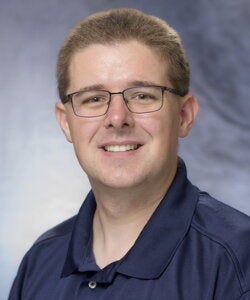
Professor Kit Clement of the University of Illinois Department of Statistics helped incorporate statistics into the Illinois Scholars Program (ISP) for the first time this past summer. Clement provided a four-week introductory course to incoming undergraduate students as part of the ISP Summer Bridge Experience program hosted by the Office of the Vice Chancellor for Diversity, Equity, and Inclusion.
ISP aims to prepare incoming students for college by offering opportunities to participate in academic workshops, peer advising, social events, and preparatory mathematics and writing instruction courses as they transition from high school to college. "One goal of ISP is to provide students with math and writing skills – skills that are going to be universal throughout their college careers, regardless of their major," Clement explained.
The inclusion of statistics in the ISP curriculum addresses a key issue identified by program leaders, which paved the way for Clement's involvement. The ISP mathematics focus put an emphasis on pre-calculus and calculus coursework that some students in the program were not fully benefiting from as the material did not intersect with their chosen major.
Through conversation with mathematics instructor Theresa Dobbs of the Department of Mathematics at the University of Illinois, Clement learned that ISP was interested in introducing a quantitative reasoning element to the curriculum. "Math courses for ISP were designed to prepare students for pre-calc or calculus I, but many students planned to take other quantitative courses that don’t require calculus like STAT 100 to meet their QR1 requirement. The addition of statistics to ISP was just a natural step to get an overall quantitative reasoning prep course for the students," Clement commented.
The addition of statistics offers a more well-rounded opportunity for students to more naturally transition to courses that satisfy the quantitative reasoning requirement for undergraduate students. Clement's course focused on making statistics relevant to students, especially those planning to enroll in STAT 100, a typical course for satisfying the university's quantitative reasoning requirement.
ISP enrolled approximately 70 students this summer, splitting the group between the mathematics and statistics course options and enrolling in a writing skills course. Twenty-four students enrolled in Clement's introductory statistics course, most of whom had indicated they were enrolling in STAT 100 this fall.
The course structure balanced rigorous academic preparation and mimicked a college course-like atmosphere, including homework and quizzes. "We met three times a week, 80 minutes each day on Monday, Wednesday, and Friday. I structured the course into two units: the first unit covered probability modeling and an introduction to inference, while the second unit focused on two-group comparisons and experimental design," Clement remarked.
Clement emphasized the importance of student-centered learning, using simulation as a tool to introduce key concepts. "So much is rooted in theoretical probability... but if you take a simulation perspective to see what happens by random chance, you can conceptually present these ideas to students through activities to have them discover some of these concepts themselves in class." This hands-on approach helped students develop a deeper understanding of statistical concepts like p-values and hypothesis testing without being bogged down by formulas.
Feedback from students was overwhelmingly positive. Some students had taken AP Statistics in high school and were struck by the depth of their conceptual understanding after the course. "The p-value was just a number they got from a procedure, they didn't understand it was a probability value," Clement said. By participating in the ISP course, students actively engaged in the learning process, gaining ownership of the process, creating their own probability models and generating outcomes.
The challenges of developing a cohesive four-week curriculum did not deter Clement. He carefully selected content that would resonate with students while maintaining a coherent flow. One of the class activities involved replicating a study on memorization and chunking of letters, which allowed students to engage with real-time data and appreciate the random assignment process.
To support these activities, Clement used TinkerPlots, a software that enabled students to simulate and model probability without requiring them to code. "The software I used with ISP was called TinkerPlots, which doesn't require them to know how to code, but they can create probability models of real-world situations that allow them to conduct simulations." The hands-on experience with TinkerPlots helped students develop a deeper understanding of probability and its applications.
Looking ahead, Clement is hopeful about continuing his involvement with ISP and expanding research on bridge programs like this one. "I would love to return to ISP -- there's a lot of potential to see how both the ISP statistics course and the ISP program generally impacts students' performance, the trajectory of their college career, and what they want to do later."
Clement expressed interest in the potential research opportunities arising from his involvement with ISP. "This is a ripe area for research on student achievement, potentially some longitudinal tracking of students who go through the program to see how students do in their STEM or quantitative courses later."
Clement's commitment to equality in education drives much of his work. "My PhD advisor and I are interested in creating curriculum and educational opportunities that are equitable and support DEI initiatives. We think this would be a really good avenue for research for an NSF proposal."
He also sees the addition of statistics as a significant benefit to the program, promoting statistical reasoning among students, whether or not they continue taking statistics courses, as statistical literacy is a valuable skill in today's data-driven world.
Clement's involvement in the ISP program has enhanced students' understanding of statistics and highlighted the critical role of quantitative reasoning in their academic and professional journeys. By blending hands-on learning with conceptual understanding, he has helped ISP students think critically and confidently approach data. As the program evolves, Clement's approach to teaching and commitment to research promise to make a lasting impact on the ISP and the broader university community.